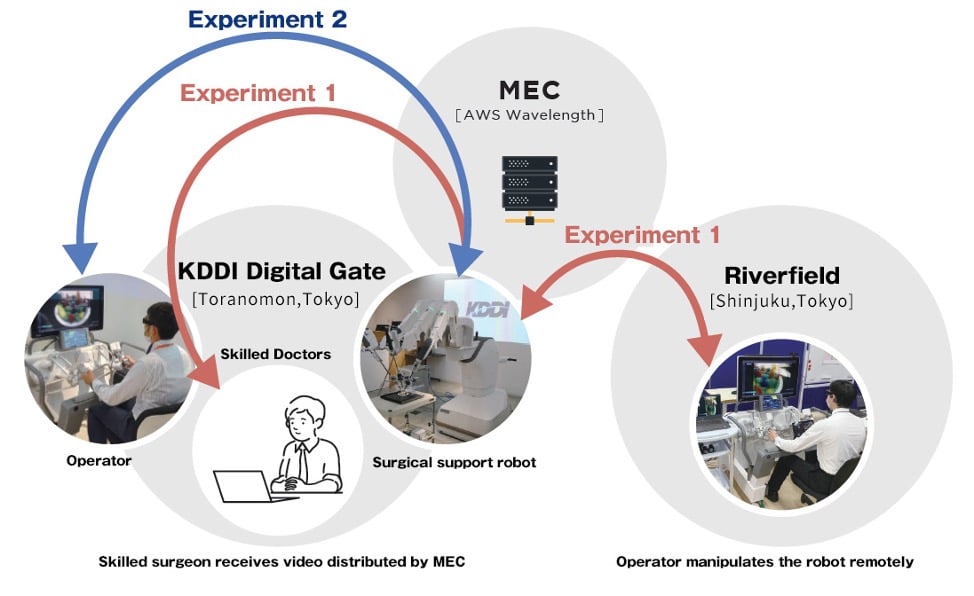Soliton partners with KDDI and Riverfield to Demonstrate Remote Surgery
- Shortage of qualified surgeons has become a major issue, especially in remote hospitals
- Soliton, KDDI and Riverfield form alliance to demonstrate remote surgical robotic devices
- The alliance proves very low latency video streaming and remote control over 5G
- Ideal for training surgeons with distributed experienced surgeons to advise
- Sets a platform for surgery to be done via robotic procedure from anywhere in the world
18 July 2022 – Amsterdam, Netherlands – Soliton Systems, headquartered in Japan and a global developer of IT Security and secure live streaming technology, has completed a revolutionary new trial in the field of remote surgery. In partnership with KDDI, a major Japanese telecommunication company, and Riverfield, a developer of robotic surgery devices, they have together proved a whole new world of wireless tele-surgery.
Tele-surgery is an emerging remote controlled surgical process, which with the use of wireless networking and robotic deices, allows surgeons to perform operations on remote or isolated patients. With the advance of 5G telecommunications and the development of Multi Access Edge Computing (MEC), innovations around remote control of global devices in absolute real time has become a reality.
The field trial was able to demonstrate two elements of remote surgery – one involving training to a distributed set of doctors, and the second a surgical robot supplied by Riverfield that was remotely controlled for surgery.
The healthcare industry is currently suffering a shortage of doctors and that is being exacerbated by a super-aging society. This acute shortage has an impact on training surgeons, and as such experienced surgeons needed for training are concentrated in the metropolitan areas. This means training surgeons in rural locations has become a major issue. This can potentially be overcome by using a surgical support robot as a training aid and allowing surgeons to train students remotely through live video distribution.
As well as training, by demonstrating the manipulation of a surgery robot, it enables futuristic ambitions where operations and surgical interventions can be completed by a remote surgeon where a patient cannot access a hospital.
This new revolution of tele-surgery is the combination of a variety of cutting edge technological advancements from all the parties involved. Soliton has developed ultra-low latency transmission of high-definition video over wireless communications at the level necessary for remote control of a surgical support robot where even a slight delay could have a catastrophic impact. When it comes to training, video needs to be distributed simultaneously to multiple skilled surgeons some of which who are in a consultative role and could be distributed, and to trainee doctors who want to observe the operation in absolute real-time. The MEC and 5G SA provided by KDDI, and the robotic device provided by Riverfield completes the technology infrastructure to fulfil telesurgery requirements.

Dr. Hajime Morohashi, Graduate School of Medicine, Hirosaki University, who participated in the demonstration said "In remote surgery, transmission delays related to video and equipment control signals are a challenge. This was the first time we performed a remote operation via the 5G SA network and MEC, and we were able to get the same feeling of operation as when we performed it previously via a wired network. In this demonstration, we were also able to provide technical guidance on surgery. We expect that various technological innovations proven such as the improvement of stability and reliability, including its use in the education of doctors, will advance studies toward its practical applications."
In the 5G SA environment, video signals were branched by a video relay server on the MEC to achieve 5G low-latency live streaming to multiple monitors. As a result, it has been confirmed that it is possible to simultaneously distribute video not only to an operating surgeon, but also to experienced surgeons and residents in separate sites for guidance and observation. The expanded 5G SA coverage, as oppose to a single point-to-point fixed line, allows location-agnostic trainings. By taking advantage of network slicing, which is one of the 5G SA features, stable communication is achieved by avoiding contention by other services on the same mobile network.
The three companies will continue to identify technical challenges when using wireless networks and collect various data for further research and development, thereby contributing to further advancements in medical diagnosis (Dx) and treatment in the medical industry, and to help alleviate the shortage in qualified surgeons.
About Soliton Systems: Since its establishment in the IT and electronics industry, Soliton has always looked at new technological trends and has realized a number of "firsts in Japan". In recent years, Soliton has been working on everything from IT security centered on authentication to cyber countermeasure products, as well as secure high-definition level video transmission systems and remote driving vehicles that can use 4G, 5G and Wi-Fi. As a global manufacturer, Soliton provides products and services that are heavily influenced by the evolving markets they serve.
For more information:
Soliton Systems
Anita Ghosh
1083 HN Amsterdam.
Netherlands.
P: +31 (0) 20 896 58 41
anita.ghosh@solitonsystems.com.



